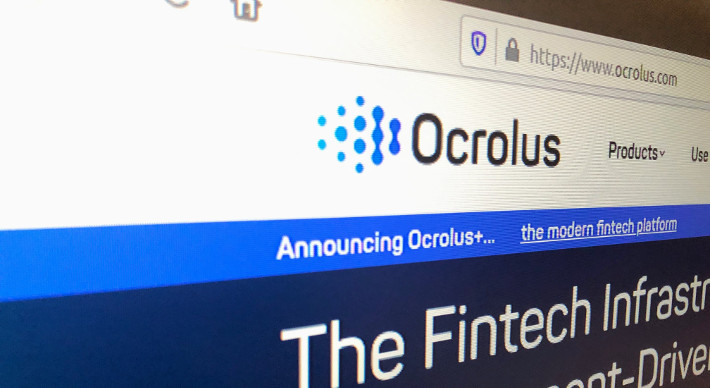Funding Circle’s Partnership With Farm Bureau Bank
August 26, 2022 “I think the main thing is that Funding Circle for a long time’s been working with banks and the way we work with Farm Bureau Bank is no different, which is we’re out here to try and put money into the pockets of small businesses,” said Angus Sanders, Chief Revenue Officer & VP Product at Funding Circle, “and Farm Bureau Bank is going to help us to do that.”
“I think the main thing is that Funding Circle for a long time’s been working with banks and the way we work with Farm Bureau Bank is no different, which is we’re out here to try and put money into the pockets of small businesses,” said Angus Sanders, Chief Revenue Officer & VP Product at Funding Circle, “and Farm Bureau Bank is going to help us to do that.”
According to Sanders, Funding Circle and Farm Bureau Bank have joined forces in delivering quality loans to small business owners. This partnership allows Farm Bureau Bank to purchase loans through Funding Circle in support of the small business community. They even extend a hand to small businesses in rural communities who may not be close to a bank to receive the services they need to grow their business.
“For those customers who are in rural areas, and perhaps can’t travel so easily to a branch, working with Funding Circle and Farm Bureau Bank, they’re able to get a loan much more easily and quickly, typical turnaround, 24 hours to offer and 48 hours to loan, which is very different to your typical small business loan. So, I say those are the primary areas where this helps small businesses,” said Sanders.
With the increase of banks wanting to do more small business lending, sometimes they struggle with finding businesses or being able to process the loans, Sanders explained. Working with organizations like Funding Circle, Farm Bureau can now provide capital faster and fund more small businesses.
During the pre and post-pandemic era, Sanders said he believes that fintech has evolved and will only continue to do so. And with fintech on the rise, Sanders said that other products like Lending as a Service, will continue to be a key growth area in the coming months.
“Farm Bureau Bank is starting with financing and we hope someday they’ll refer deals to us, […] but what this really shows is the deepening focus on partnerships between fintechs and banks, and particularly this emergent Lending as a Service product, which within Funding Circle sort of takes the lead on but lots of other fintechs go into and I think you’ll see, you’ll see more about that in the coming months,” said Sanders.
Ocrolus Meets Lendflow
August 19, 2022 Fintech infrastructure company Ocrolus has joined forces with Lendflow, an embedded credit platform to make it easier and faster for lenders, fintech companies, and SaaS companies to offer credit.
Fintech infrastructure company Ocrolus has joined forces with Lendflow, an embedded credit platform to make it easier and faster for lenders, fintech companies, and SaaS companies to offer credit.
“Ocrolus is a part of Lendflow’s platform,” said David Snitkof, Head of Analytics at Ocrolus. “So, if a lender is using Lendflow, they have the ability to then use Ocrolus through Lendflow and be able to automate the digitization of documents, automate the credit analysis that we do on those documents, automate cash flow analysis of small business borrowers, and make it very, very easy to seamlessly take all of the analytics that Ocrolus generates and puts them into Lendflow’s Decision Engine to facilitate good and speedy decisions.”
Lendflow allows for a wide range of companies to create digital lending experiences to help them grow.
“It’s really tailored to what the users of that product wants to do and the proprietary data that relates to the users of that product, all that kind of stuff,” said Snitkof. “And, it enables Lendflow customers to do a couple things. It enables them to provide a more holistic customer experience, but it also provides them another way of monetizing their software products and their customer experience.”
The two companies, Ocrolus and Lendflow, found an easily integrated synergy between their products. Lendflow’s decision engine allows their clients to be exposed to Ocrolus’ data, analytics and features and later decide which basis they would like to create approval for.
“So, they can say, ‘hey, I want to get these 20 different fields from Ocrolus whenever an application comes through and now I’m going to choose, you know, this field and this field and this field’ and set different thresholds and different criteria for who gets approved and how they get approved and what kind of line they get, what kind of price they get, depending on the results of that data,” said Snitkof.
Ocrolus has quickly expanded and helped process more than 200,000 small business applications monthly. And with their new collaboration with Lendflow it will allow them to help lenders make better decisions.
“We take a lot of pride in taking this world of data, and providing it to our customers in an efficient way, in a highly structured way, in a trusted way. And ultimately, with really good analytical insights to help them make a high-quality decision,” said Snitkof.
Junior Wall Streeters
August 17, 2022 Two years ago, Kevon Chisolm and son Kamari Chisolm paired together to create Junior Wallstreeter, a component of Black Wallstreeter, to empower the youth on financial wellness. The Virginia-based father-son duo are on a mission to give minority kids from disadvantaged backgrounds an opportunity at education in financial literacy.
Two years ago, Kevon Chisolm and son Kamari Chisolm paired together to create Junior Wallstreeter, a component of Black Wallstreeter, to empower the youth on financial wellness. The Virginia-based father-son duo are on a mission to give minority kids from disadvantaged backgrounds an opportunity at education in financial literacy.
“I strongly believe that regardless of your financial situation you deserve a financial education,” said Kevon Chisolm, Esq., Executive Director at Junior Wallstreeter.
Junior Wallstreeter offers a virtual camp in the summer on financial literacy and investing, allowing kids to learn skills in banking, budgeting, credit ratings, and more. The two-week summer camp ranges between $300 and $325, and for kids who may not be able to afford it they can potentially obtain a scholarship.
“So, for 10 days, kids are learning how to track their investments,” said Chisolm, “and we try to get the kids to understand and how to become investors more than consumers. So, I like to say rather than buy a pair of Nike, invest in Nike.”
Learning about finances between ages 10-11 from his dad, Kamari has been well-educated on the importance of financial intelligence. He tries to help his friends with their decision-making on spending and saving money so they can be just as equipped in financial literacy as he is.
“It’s helped me a bunch of different ways. It’s helped me see things on TV from a different perspective,” said Kamari Chisolm, “and it’s helped me teach my friends different things. […] But I think that with the financial literacy knowledge I’ve learned, I’ve helped my friends save money and hopefully encourage them to invest in the stock market so they can make more of their money.”
Unlike other programs, after camp is over kids are able to be a part of Junior Wallstreeter Alumni to make sure kids are practicing the skills they learned. Alumni campers meet throughout the year from September to April-May with different topics to continue this ongoing learning experience.
“We just want to make sure that the kids are still applying the information, that it didn’t just go out the window for the summer camp, so we have this ongoing,” said Chisolm.
Chisolm believes that the biggest misconception people have today about loans is the fact that they are tied to credit ratings.
“I don’t think we really understand the importance of credit and how that plays a role in obtaining a loan, house, car, student loans, anything. I don’t think we understand that,” said Chisolm.
Along with misconceptions on loans, even standard terminology when taking out a loan such as APR, Fixed Interest Rate and Variable Interest Rate may not be common knowledge to the youth and even adults. The 12 year-olds attending the camp may not necessarily need to know how to take out a loan just yet but they do receive a handbook from the program that they can refer back to when the time comes.
“No, [people don’t understand APRs] and that’s why we go over credit card applications. We teach the kids that. So if they’re following along and we give them a student workbook that lets them understand comparing different credit cards, like a credit card loan offer APR, ‘if they offer a higher loan, if they can offer you this,’ this is a how do you determine which credit card is the best,” said Chisolm.
The power of knowledge allows Kevon and Kamari to pass along the information they possess to the youth and adults throughout their journey of making financial education accessible to all.
“This is passionate to me,” said the elder Chisolm. “My love for our people and making a difference and just giving back, right, just work on giving back with the knowledge and tools that I have. We’re not perfect, but we’re just trying to make a difference.”
The Power of the Suit
August 15, 2022 Getting out of bed in the morning can be rough after a long night’s rest but jumping into your work outfit is like putting on a superhero cape to go out and save small businesses that need capital. Working in the finance industry, wardrobe is the last thing mentioned in regards to the job itself, but it is what allows many to put their best foot forward.
Getting out of bed in the morning can be rough after a long night’s rest but jumping into your work outfit is like putting on a superhero cape to go out and save small businesses that need capital. Working in the finance industry, wardrobe is the last thing mentioned in regards to the job itself, but it is what allows many to put their best foot forward.
“I come from a suit and tie background, it’s like a uniform,” said Mike Brooks, owner of Best Connect Capital. “So, when you’re a broker and you’re dealing with business owners, you’re holding a lot of weight, a lot of power in your hands, especially when you get a good client on the hook. So, I just feel that dressing appropriately whether it’s a suit and tie or work casual is absolutely essential.”
There’s a saying, Brooks continued, “When you look good you feel good.”
“I’m a woman, I like to dress up, it’s fun but most importantly we’re working in a male dominated industry,” said Angelina Fletcher, Director of Business Development at Wing Lake Capital. “A lot of the brokers and lenders that I work with have been in the industry for 20 plus years, they’ve already built their brand, I’m still building my brand. Walking into these events looking fresh and professional makes me feel good and confident so I can focus on networking.”
And when striving to close those business deals, having a special piece of clothing that gives one an extra push can dictate the confidence he/she possess throughout the day. Whether it’s a favorite tie or a favorite pair of shoes, there can be an item that sets the tone.
“My biggest thing is my Rolex watch, when you’re in situations it definitely gives you a sense of confidence,” said Brooks. “It’s a life milestone to be able to purchase a Rolex even if people are way past that point in their mind.”
It’s not so much about accessories, however, to Dr. Rev. R.J. Rochelle, Business Financial Planner & Exit Strategist. Rochelle starts his day off by being active.
“I’ll take a pre-workout,” Rochelle said. “Now that pre-workout gets me pumped, it’s better than coffee. And then I’ll go work out.”
On wardrobe, Rochelle said he finds it important to put his best foot forward when he’s out meeting potential clients in person and that the mindset comes more from starting off the day with music or a sales podcast.
“When I commute or when I’m about to go out to the field in particular to get pumped up, I may play like Commas by Future because we’re talking about making money,” Rochelle said.
Fletcher of Wing Lake also has a routine that gets her started.
“I meditate, I drink my coffee and I have liquid IV,” she said.
Whatever the routine or the gear, there’s a little magic to it all.
“if you’re like a medic or a police officer or you’re in the army and you’re wearing like clothes that don’t match up with what you’re doing… I’m sure [they’d] feel different,” said Brooks of Best Connect Capital.
Funders Weigh in on the New Disclosure Law in Virginia
August 10, 2022 “I think there are pros and cons on this law,” said Boris Kalendarev, CEO at Specialty Capital, in regards to the recently enacted sales-based financing disclosure law in Virginia. “I’m on the pro side and I think first and foremost it allows the good funders and the good brokers in the space to operate in the right manner.”
“I think there are pros and cons on this law,” said Boris Kalendarev, CEO at Specialty Capital, in regards to the recently enacted sales-based financing disclosure law in Virginia. “I’m on the pro side and I think first and foremost it allows the good funders and the good brokers in the space to operate in the right manner.”
The law technically went into effect on July 1st, shaking things up for funding providers and brokers alike, particularly through a set of uniform disclosures that are required every time a contract is put in front of a Virginia-based business.
“It holds a broker more responsible for the transaction that they’re going to complete,” said Sharmylla Siew, Senior Underwriter at Lending Valley. “It builds a deeper bond between the broker and the merchant. And it also creates a better bond between the broker and the funder.”
Echoing Siew’s perspective, Kalendarev also believes that being clear creates an honest business space for the broker, merchant, and funder.
“I think transparency is really the right way to run this business. Let’s try to make sure there’s even more transparency,” said Kalendarev.
One intent behind the law is to provide the business customer with all of the pertinent information in a digestible format. Notably, this includes the commission that a broker may be receiving from the funder.
 “I do believe that it should be fully transparent on both sides to understand the transaction in full,” said Dylan J. Howell, CEO of Liquidibee. “The merchant should understand that the broker is getting compensated. And if he decides that the broker deserves an additional commission on top of what he’s getting paid from the funder, well, that’s an informed decision between the merchant and broker to come to an agreement with.”
“I do believe that it should be fully transparent on both sides to understand the transaction in full,” said Dylan J. Howell, CEO of Liquidibee. “The merchant should understand that the broker is getting compensated. And if he decides that the broker deserves an additional commission on top of what he’s getting paid from the funder, well, that’s an informed decision between the merchant and broker to come to an agreement with.”
Howell Suggested that some of what is required would be expected in other types of deals.
“If you would go out and buy a $500,000 house, you get to the closing table and you look at the bill, it says it’s $545,000, but the purchase price is 500,000, you would want a reconciliation page to show where that 45,000 of additional capital is going,” Howell said. “And it’s no different than in this transaction, in my opinion.”
Banks and credit unions were exempt from the law but some view targeted regulations like this one as a way to raise the bar and credibility of sales-based financing products in general.
“Merchants who wouldn’t have considered an MCA as a practical form of funding in the past may decide to explore this avenue knowing that the industry is being held to a higher standard of practice,” Howell said.
Siew, of Lending Valley, echoed same.
“I am actually very excited about the new regulations, and I feel that it would make a huge impact on the MCA industry,” she said.
Work With a Broker or Go Direct?
August 2, 2022“I believe that a merchant might be better off going to a broker so the broker can make available to the merchant several different offers,” said Pooja Nene, Broker Relations Manager at Balboa Capital. “And if they’re doing what they need to do correctly and if they’re really consulting the merchant correctly, I think that they would be providing the best offers to the merchant based on their needs.”
 It’s the age-old question, are merchants better served by using a broker or going direct? Opinions vary and are usually colored by what role one has in the process.
It’s the age-old question, are merchants better served by using a broker or going direct? Opinions vary and are usually colored by what role one has in the process.
“The advantages of working with a broker is it saves the merchants a lot of time, and in some cases saves them money in fees,” said Randy Guerrier, Senior Funding Executive at Banana Exchange, a company that provides capital to MCA providers. Guerrier’s vantage point makes him less biased. “A lot of brokers do have a lot of preexisting relationships and wholesale rates that they could get with their relationships,” he said.
Matthew Washington, Founder & CEO of Moneywell GRP, says there’s a bit more nuance to the whole thing.
“The reality is that when the merchants go direct with lenders, they’re essentially dealing with the lender’s broker shop, right?” he explained. “Any lender that gets directly contacted by a merchant usually gives them off to their sales team, which [is also able] to send [them] off to other lenders.”
Washington, whose company is a funder, was an advocate for what brokers can accomplish for their clients especially since he relies entirely on them for business. He emphasized that his company is one that doesn’t have a direct sales team to handle any direct inquiries.
“All my business comes from my ISO channel,” he explained. “So when I approve a deal, it’s up to me and the broker to win it if there’s competition, but if I declined the deal, my brokers take that deal to another lender that has an appetite for that particular scenario.”
 “[Lenders] may not have the staff available to form that relationship with a merchant,” said Pooja Nene of Balboa about the debate on broker vs. direct. She also cautioned that sidestepping a broker in the process might not translate into an increased likelihood of approval.
“[Lenders] may not have the staff available to form that relationship with a merchant,” said Pooja Nene of Balboa about the debate on broker vs. direct. She also cautioned that sidestepping a broker in the process might not translate into an increased likelihood of approval.
“If it’s the first round of funding, if it’s their first loan schedule, we don’t know who this merchant is, and we may feel a little bit more comfortable with that file coming through the broker and the broker discussing the terms with the merchant,” she said.
Guerrier of Banana Exchange said, “It always comes down to working with the right type of broker, right? It comes down to the person that answers the phone that’s working with you, whether it’s at a big company or small company, I like to look at things from the individual working with the right people.”
And finding the “right people” isn’t automatic because they still have to be found, and once they’re found the lender has to decide if the customer is also right for them. Speaking about that in relation to all the economic uncertainty, Washington of Moneywell GRP said that a funding company should stick to what they’re comfortable with and not “chase deals” that they wouldn’t normally fund.
“But, also [on being found], I would market the heck out of my company and make sure that everyone in the world knows what I do, my product line, my branding, my logo, and make sure that anyone that is looking for capital that they know ‘hey, this company is always popping up,’ and I’d make sure that I stand out,” Washington said.
A Code “Quiltt” for Fintechs
July 18, 2022 It’s called Quillt, a low-code tool that allows companies to integrate with several third-party services to either pull in datasets or act on data.
It’s called Quillt, a low-code tool that allows companies to integrate with several third-party services to either pull in datasets or act on data.
Quiltt says their tool detracts the need for companies to hire costly engineers to integrate their services one at a time. In doing this it allows for data to be accessed instantly by “abstracting away” the need for any organization to integrate with services one at a time and “right the business logic” required to each individual service into a single integration.
“So, with us, regardless of who’s in your data stack, we can essentially have a backend that processes all that information so you can focus on whatever your core focus is at the end of the day, as opposed to repetitive data, plumbing, and infrastructure,” said Mark Bechhofer, Cofounder & COO.
The low code aspect of it is modules with just a couple lines of code that anyone can paste into their application and embed a frontend experience. Startup companies that are looking to build in fintech with small teams and little funding could also seek assistance through Quiltt, according to Bechhofer. It could even be a bank or a credit union that wants to focus on their core competency and not worry about adding commoditized feature sets that their competitors already have.
“We are issuing cards and processing transactions, we are really doing the data intelligence around money,” said Bechhofer.
Before Covid, Bechhofer and business partner Ruben Izmailyan were selling a white label suite of DFM apps to banks and credit unions. The two business partners were often asked how they had built this backend infrastructure to take in data from “disparate sources” and combine it, analyze it, standardize it and make sense of it.
“We realized that was actually a much larger market with potentially a much larger play. And so we kind of ripped apart our old application into what I call like a Lego box and fintech infrastructure, and pivoted the company into what it is today,” said Bechhofer.
Driven by the mission of bringing financial wellness to as many people as possible, the team at Quiltt is excited about the possibilities ahead.
“We think that providing this new abstraction layer of technology will empower many new types of fintech builders and essentially give license to folks who maybe aren’t full time data scientists or engineers without worrying about hiring expensive teams. We’re really excited about what people might build on our platform that we haven’t even envisioned,” Bechhofer said.
Need a “Lenda?”
July 13, 2022LendingTree helped Linda get a “lenda.” Former SNL star Molly Shannon, playing Linda, explains to waitress, Brenda, how hassle-free finding a personal loan through LendingTree was for her. The newly released commercial uses assonance to get viewers to understand how easy it is to get the best possible loan. In the commercial, Brenda is under the impression that LendingTree is only for “big spendas” but learns that they will find her a lender despite the circumstances.
Another “Linda lenda” commercial is featured on LendingTree’s home page where Linda tells her niece how they assisted her on a home loan as well. The objective is get viewers to understand how getting a loan can be just as effortless for them as it was for Linda.






























